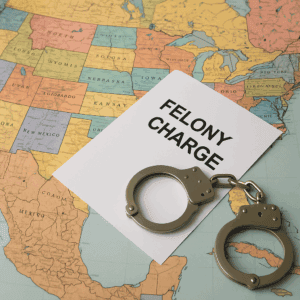
If you’ve been charged with a felony in the United States and your case is still pending, it’s natural to feel uncertain about what you can and cannot do — especially when it comes to something as fundamental as traveling out of state. Whether it’s for work, family emergencies, or personal reasons, people often wonder: Can you legally leave the state with a pending felony charge?
The short answer is: not without explicit permission. Let’s break down what’s at stake, how court-imposed conditions work, and what the consequences could be if you violate them.
What Is a Pending Felony?
A “pending felony” refers to a situation where you’ve been charged with a felony crime, but the legal process is still ongoing. This means that your case hasn’t yet reached a final resolution — whether through a plea deal, trial, or dismissal. You’re technically presumed innocent, but you’re also under the court’s supervision during this time.
Felony charges are the most serious classification of criminal offenses in the U.S., often carrying penalties of more than one year in prison. Common examples include burglary, aggravated assault, drug trafficking, and certain types of fraud. Because these are high-stakes cases, courts tend to impose strict conditions on defendants while the case is active.
Bail and Release Conditions Typically Restrict Travel
If you’re out on bail or have been released on your recognizance, the court likely imposed a set of conditions you must follow. One of the most common is a travel restriction. In many felony cases, defendants are prohibited from leaving the state without prior approval from the court or their supervising authority (such as a probation officer or bail bondsman).
These restrictions are in place for a reason. Courts want to ensure that defendants remain available for court appearances and are not a flight risk. Allowing someone to leave the jurisdiction — especially with a serious charge pending — could increase the chance of them not returning to face trial.
Can You Get Permission to Leave the State?
Yes, it’s possible to request permission to travel, but approval is not guaranteed. If you have a valid reason — such as a family emergency, work obligation, or medical need — your attorney can file a motion asking the court to modify your release conditions temporarily.
Factors that may influence the court’s decision include:
- The nature and severity of the felony charge
- Your prior criminal record, if any
- Your ties to the local community (e.g., family, employment, residence)
- Whether you’ve complied with all court orders so far
- The purpose and duration of your requested travel
It’s crucial to understand that leaving the state without permission is considered a violation of your release terms and could result in your bail being revoked, a warrant being issued for your arrest, or additional charges.
What Happens If You Leave Without Permission?
This issue is especially important in large metropolitan areas with strict pretrial supervision — learn what happens if you leave the state with a pending felony in Los Angeles, where even a brief unauthorized trip across state lines can lead to serious legal consequences. While the specifics may vary by jurisdiction, most courts across the U.S. take a similar stance: don’t travel without permission.
Leaving the state with a pending felony charge and no authorization is a risky move. Here’s what might happen:
- A bench warrant could be issued. Law enforcement will be authorized to arrest you for violating your release conditions.
- You could forfeit your bail. If you posted bail, you — or whoever paid it on your behalf — could lose that money.
- You may face additional charges. Violating court orders can result in new criminal charges, such as failure to appear or bail jumping.
- Extradition is possible. If you’re detained in another state, authorities can return you to the original jurisdiction through formal extradition proceedings.
- Your legal situation becomes more complicated. Judges take violations seriously. Ignoring court-imposed restrictions can hurt your credibility and increase the likelihood of harsher sentencing if you’re convicted.
What About Travel Within the State?
Even travel within your home state can sometimes be limited, depending on your case and supervision level. For example, some defendants are placed on electronic monitoring or are required to remain within a certain county. Always clarify the specifics with your attorney or supervising agency.
Final Thoughts: Don’t Guess — Ask First
If you have a pending felony charge, never assume it’s okay to leave the state — even for a short period. Every court and every case is different. Your best course of action is to speak with your attorney before making any travel plans. They can help you understand your current restrictions and, if needed, formally request permission from the court.
Trying to sneak around the system almost always makes things worse. In contrast, showing respect for the legal process and following the rules can work in your favor when your case is resolved.
When in doubt, ask. When facing a felony, playing by the rules isn’t just smart — it’s essential.